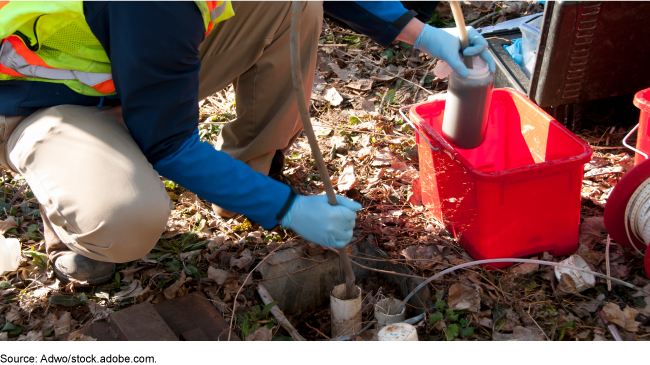Nuclear Waste Cleanup: DOE Should Use Available Information to Measure the Effectiveness of Its Groundwater Efforts
Fast Facts
The Department of Energy is responsible for cleaning groundwater contamination that poses threats to public health and the environment.
At 4 sites we examined, of the 13 involved, DOE is cleaning groundwater to drinking water standards. Site officials estimated these efforts will collectively cost at least $10 billion over the next 5 decades.
However, DOE doesn't have comprehensive information on cleanup progress at all 13 sites. As a result, it may underestimate the needed resources.
Our recommendations address this and other issues we found.

Highlights
What GAO Found
The U.S. Department of Energy's (DOE) Office of Environmental Management (EM) is responsible for cleaning up groundwater contamination at 13 sites. The four sites GAO examined are cleaning groundwater to meet drinking water standards based on the intersection of several laws that drive cleanup requirements, including the Safe Drinking Water Act, as amended. In cases where it is technically impractical to meet the standards, EM could seek a waiver. Two of GAO's four selected sites are exploring the use of such waivers, but none have been used as of September 2024.
The four sites GAO examined have an estimated groundwater cleanup cost of at least $10 billion over the next 5 decades. However, EM headquarters was unable to identify comprehensive information on the scope, cost, and schedule of groundwater cleanup for all 13 sites because the database combines groundwater and soil cleanup information together. EM protocol states that EM headquarters is responsible for providing technical and policy support for groundwater cleanup. Access to comprehensive scope, cost, and schedule information for groundwater cleanup would enable EM headquarters to better understand the resources needed to meet cleanup requirements.
Estimated Completion Dates for Groundwater Cleanup by Selected Site

The four sites assess groundwater progress using metrics that attempt to measure the effectiveness of cleanup. However, EM headquarters' performance metrics do not provide useful information on EM's overall groundwater cleanup progress. For example, EM tracks the number of groundwater wells as a progress metric. However, sites may install new wells for a variety of reasons, such as to replace decommissioned wells. Thus, there is not always a direct relationship between new wells and meeting cleanup requirements.
EM protocol states that results from performance evaluations should inform EM's planning, budgeting, and execution activities, as well as provide lessons learned for improving management processes. EM is developing new qualitative groundwater performance metrics to consistently track progress at all sites. However, until EM aligns performance metrics with groundwater cleanup goals, decision-makers cannot assess whether billions of dollars in cleanup investments are achieving the desired results. Additionally, by leveraging available site-level performance information, decision-makers could draw useful conclusions about cleanup progress and derive valuable lessons learned.
Why GAO Did This Study
EM is responsible for addressing hazardous and radioactive waste from nuclear weapons production and energy research at DOE sites. Contaminated groundwater at these sites poses threats to public health and the environment, making groundwater cleanup critical to EM's mission.
GAO was asked to review EM's groundwater cleanup efforts. This report examines (1) the groundwater cleanup requirements at selected EM sites; (2) the scope, cost, and schedule for groundwater cleanup; and (3) the extent to which EM measures groundwater cleanup progress.
GAO examined four sites selected to represent a variety of facility types at different stages of the cleanup process governed by different regulatory frameworks. GAO examined relevant laws and regulations and reviewed agency documents on groundwater cleanup. GAO interviewed officials from EM, the U.S. Environmental Protection Agency, and state regulators.
Recommendations
GAO is making three recommendations, including that EM headquarters collect and use comprehensive information on groundwater cleanup scope, cost, and schedule for all EM sites to enhance technical and policy support provided to sites and inform resource allocation decisions; and develop and use performance metrics to monitor progress toward cleanup goals. DOE concurred with all of GAO's recommendations.
Recommendations for Executive Action
| Agency Affected | Recommendation | Status |
|---|---|---|
| Office of Environmental Management | The Senior Advisor for the Office of Environmental Management should ensure that EM headquarters collects and uses comprehensive information on groundwater cleanup scope, cost, and schedule for all EM sites to enhance technical and policy support provided to sites and inform resource allocation decisions. (Recommendation 1) |
As of September 2024, DOE indicated that they are coordinating with sites to make groundwater-specific scope, cost, and schedule information available to headquarters and expect to implement the recommendation by September 30, 2025.
|
| Office of Environmental Management | The Senior Advisor for the Office of Environmental Management should establish groundwater cleanup strategic objectives and near-term performance goals for groundwater cleanup that cover all sites and more specifically guide sites' progress in meeting the groundwater cleanup requirements. (Recommendation 2) |
As of September 2024, DOE indicated that implementation actions were ongoing with an expected completion of September 30, 2026.
|
| Office of Environmental Management | The Senior Advisor for the Office of Environmental Management should develop and use performance metrics to regularly inform groundwater cleanup decisions and document progress toward cleanup goals. (Recommendation 3) |
As of September 2024, DOE indicated that implementation actions were ongoing with an expected completion date of April 30, 2027. Additionally, DOE will use the Tracking Restoration and Closure system as a tool to aid in the documentation of progress towards cleanup. According to officials, this tool is in the final stages of development.
|
